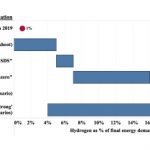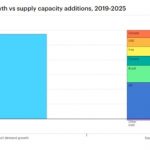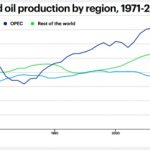Low emission hydrogen is expected to play an important role in global decarbonisation, though costs today are very high and must come down. Economies of scale will help, but production is yet to pick up pace as there are inadequate ‘demand signals’ which result in financial risks for project developers. Kapil Narula and Luciano Caratori of Climate Champions Team, Laurent Antoni at IPHE, and Nigel Topping (former UN Climate Change High-Level … [Read more...]
Gulf States are investing in Carbon Capture to maintain Hydrocarbon business
The Gulf region wants to maintain their substantial revenues from hydrocarbons in a decarbonising world. One way to do that is to invest in carbon capture, to make cleaner and more marketable fossil fuel products. Megren Almutairi and Karen Young at CGEP look at their current plans and future prospects. Right now, about 10% of CO2 captured globally is in the industrial facilities of the Gulf States. Their national oil companies boast some of the … [Read more...]
Tandem solar cells (perovskite + silicon) can reach 40% energy conversion rates
Tandem solar lays new perovskite cells over standard silicon cells. Perovskite absorbs the shorter wavelengths of light that silicon misses. So the thin layer of perovskite collects the visible wavelengths, and lets the near-infrared light through to the silicon underneath. Martina Grünwald and Sarah Michaud writing for the WEF point at the results of R&D and demonstrations in Germany, Switzerland, Saudi Arabia and China. Energy conversion … [Read more...]
Scaling Hydrogen financing in Emerging Markets and Developing Countries
To meet the global target for clean hydrogen of 10-15% of energy use by 2050 we need to produce 40m tonnes by 2030. The rich OECD countries simply do not have the renewables resources to do it alone. So there must be a global effort to actively support hydrogen production in Emerging Markets and Developing Countries (EMDCs), explain Carolina Lopez Rocha and Dolf Gielen at the World Bank Group and Ignacio de Calonje at the IFC. They summarise the … [Read more...]
Renewed interest in Carbon Capture strategies for net-zero: targets, obstacles, costs, priorities
Martina Lyons at IRENA picks out the highlights of their new report “Reaching Zero with Renewables: Capturing Carbon”. Carbon capture is going to be expensive, so should be focussed on hard-to-abate industrial sectors, as well as bioenergy plants. Lyons breaks down the target carbon capture volumes, costs and the investments required, as well as looking at the consequences of different strategies and carbon prices. Scaling up this technology, … [Read more...]
Saudi Arabia’s clean hydrogen plans for converting ambitions into action
The recent Memorandum of Understanding with Germany on clean hydrogen cooperation underlines Saudi Arabia’s ambition in becoming a global powerhouse producer in this field. Governments and industry players are currently considering clean hydrogen as an energy vector with key energy transition roles in an increasingly carbon-constrained world. Hydrogen has the potential to grow into a trillion-dollar commodity market, with enormous opportunities … [Read more...]
Will Saudi Arabia build the world’s largest green hydrogen and ammonia plant?
The Gulf is already a major producer and consumer of hydrogen, mainly for fertilisers and specialty chemicals. Like most hydrogen produced globally, it is the ‘grey’ kind made from hydrocarbons. But the region’s low renewable power costs and abundance of land give it the key components for the industrial scale production of green hydrogen. So in July, the Saudi model city of Neom (Neom means “new future”) and ACWA Power signed a joint venture … [Read more...]
Coronavirus bailouts should be explicit, not hidden by CO2 tax cuts. And nothing for Oil
Many industries will be pleading their case for a Coronavirus bailout. Severin Borenstein at the Energy Institute at Haas explains why the oil industry should not be one of them. Oil prices, already on the slide, are indeed sinking lower thanks to the pandemic. But decarbonisation should be sending them that way anyway. And the oil price has always be artificially high thanks to the OPEC cartel and weak or complicit “competition” from non-OPEC … [Read more...]
60 years on, OPEC should take control again, cut supply, raise prices to fund its Transition
OPEC is often seen as no friend of the Transition. But Greg Muttitt points out that, although it did take an anti-climate stance in the 1990s, by the 2000s it had stepped back from climate negotiations, while some OPEC members became supporters. Muttitt says that, celebrating its 60th anniversary, it’s time for OPEC to remember its roots and organise its members to take control of their own destiny in the face of the inevitable rise of clean … [Read more...]










